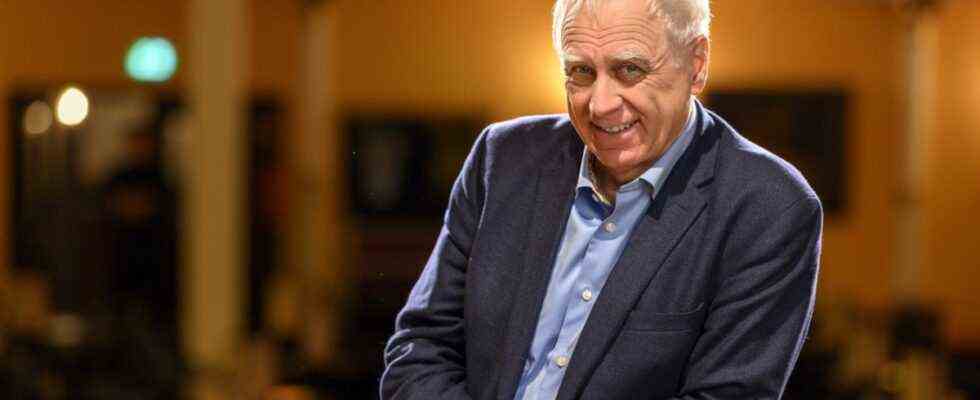There was unison talk of a bang when a written message from Till Hofmann made the rounds last Friday. To the surprise of even the biggest insider, he announced that he would be retiring from the Lach- und Schießgesellschaft at the end of this month as managing director and co-partner. “You never go halfway”, was the title of the despatch, which is true because Steffi Rosner, the booker, the only permanent employee and girl for everything in the “store”, like Lach- und Schieß for decades, goes with him Friends is called.
A turning point after more than 20 years, the reasons for which are only hinted at in Hofmann’s letter: “Due to the death of Dieter Hildebrandt, the later departure of Renate Hildebrandt and, most recently, the death of Wolfgang Nöth, the composition of Lach & Schieß Betriebsgesellschaft mbH has changed several times. In the current shareholder constellation, it was unfortunately no longer possible to find a consistent, common line for the further management and orientation of the laughing and shooting society. ” The background is likely to be the chilled relationship between Hofmann and fellow partner Bruno Jonas.
Jonas had once brought Hofmann, who comes from Passau, to cabaret and the Munich scene in the first place. They met in 1987 when the 17-year-old student representative Hofmann persuaded the well-known cabaret artist Jonas to perform at the Leopoldinum-Gymnasium in Passau. Hofmann later accompanied him on tour as a technician, and when a few years later – Hofmann was training to be a physiotherapist – Wolfgang Nöth left the comedy theater leaseholder, Jonas brought the energetic youngster as his successor. With such great success that five years later, when the Lach- und Schießgesellschaft was facing bankruptcy, Dieter Hildebrandt brought him to the Lach- und Schießgesellschaft – on the express recommendation of Bruno Jonas.
In the end, of course, Jonas is said to have viewed Hofmann’s diverse activities – for example at the cooperative cultural center “Bellevue di Monaco” – more and more skeptically and was also dissatisfied with the organization of the laughing and shooting society. Now he wants to take over the artistic direction himself. Stefan Hanitzsch, son of the cartoonist Dieter Hanitzsch and operator of the “stoersender.tv” web format devised by Dieter Hildebrandts, is to become the managing director and take over Hofmann’s share. Notary appointment is on Wednesday. Until then, and “until I have agreed with my partners”, Jonas does not want to say anything about the process or future plans.
What is currently being reorganized is probably the most traditional and famous cabaret institution in the republic. It is important to preserve the legacy of a Sammy Drechsel and a Dieter Hildebrandt. The two – one an omnipresent sports reporter, all-world connoisseur and gifted string puller, the other the most talented author and actor of his time, who was to become a synonym for laughing and shooting as well as for German political cabaret in general – had the shop Founded in 1956 as a pure ensemble venue. On December 12th, the first program “Because you don’t have to do what you do” with Hildebrandt, Ursula Herking, Hans Jürgen Diedrich and Klaus Havenstein premiered. After a short start-up time, word of the troupe’s new, cheeky tone got around, thanks to Drechsel’s contacts, celebrities were sitting in the narrow pews, and the performances were soon sold out weeks in advance. Later, the annual New Year’s Eve TV broadcasts became almost as iconic as “Dinner for One”.
Now the fate of the Lach- und Schießgesellschaft is in new hands: For Till Hofmann …
Image: Stephan Rumpf
… comes Bruno Jonas.
Image: Ralf Wilschewski
For Steffi Rosner …
Image: private
… Stefan Hanitzsch.
Image: private
The best were recruited from all over Germany, from Henning Venske, Rainer Basedow, Jürgen Scheller and Ursula Noack to Horst Jüssen, Jochen Busse and the unforgettable in-house copywriter Klaus-Peter Schreiner. After the fall of the Wall, grandees from the East were also on the stage with Simone Solga, Hans-Jürgen Silbermann and Hans-Günther Pölitz. Bruno Jonas was the first real Bavarian in the ensemble in 1981 to become a solo star like so many from there. In the stories and the history of the laughing and shooting society, the historical contrasting baths of the Federal Republic as well as the developments of the cabaret scene are reflected. In 1972 there was the first big crisis and pause, when one felt superfluous with the 68 movement and a social-liberal government.
The new beginning from 1976, which also introduced the many guest performances of all cabaret greats to this day, lasted with ups and downs and final infirmity exactly until December 30, 1999. The old-style cabaret ensemble was an anachronism, the shop so good how broke. Till Hofmann then became a reformer and renovator. The shareholder structure was detoxified, the house was rebuilt and modernized, and the core business was relocated to the presentation of the critically creative elite of German-speaking cabaret. In the growing cabaret empire of Till Hofmann, the shop found its place between the clubhouse and the comedy theater, without losing its reputation or denying its tradition, which has now been cultivated again with stylistically new ensembles.
Interestingly, Hofmann is anything but offended. “After 20 years, it is perhaps really time for something new. That is also a democratic decision of the shareholders. And Bruno Jonas can lead the shop to new shores with his name and as an outstanding cabaret artist. The prerequisites are with that new ensemble, which was sponsored by the city for the first time. ” Sounds forgiving. And confident. Hopefully he’s right.

